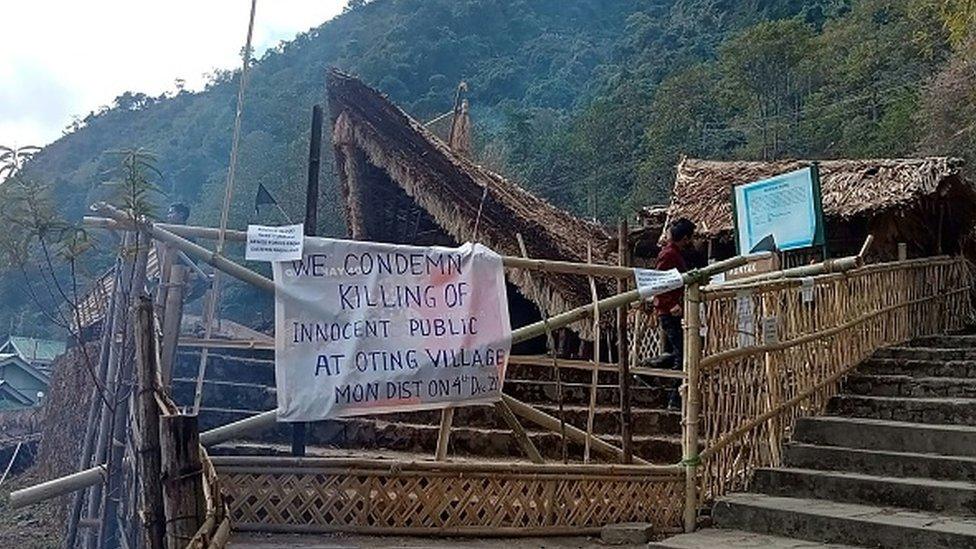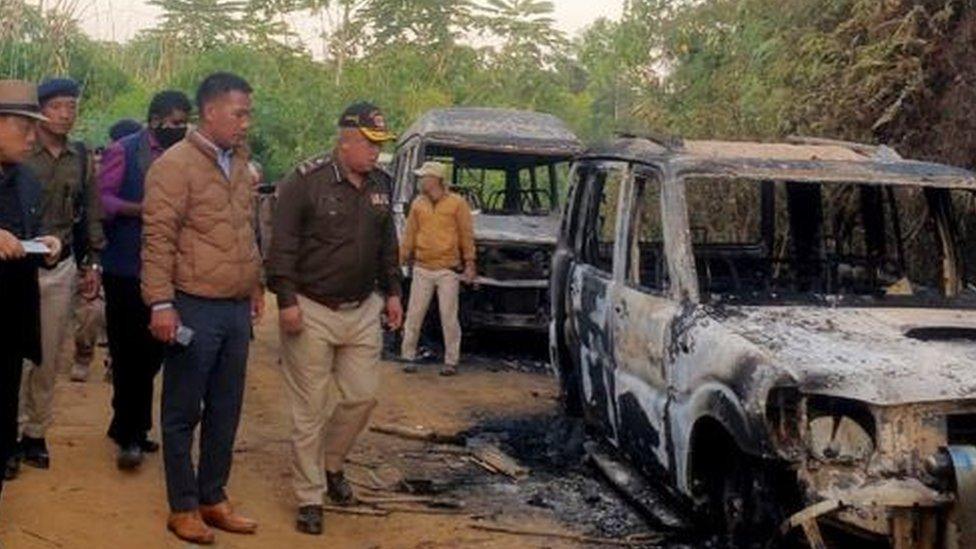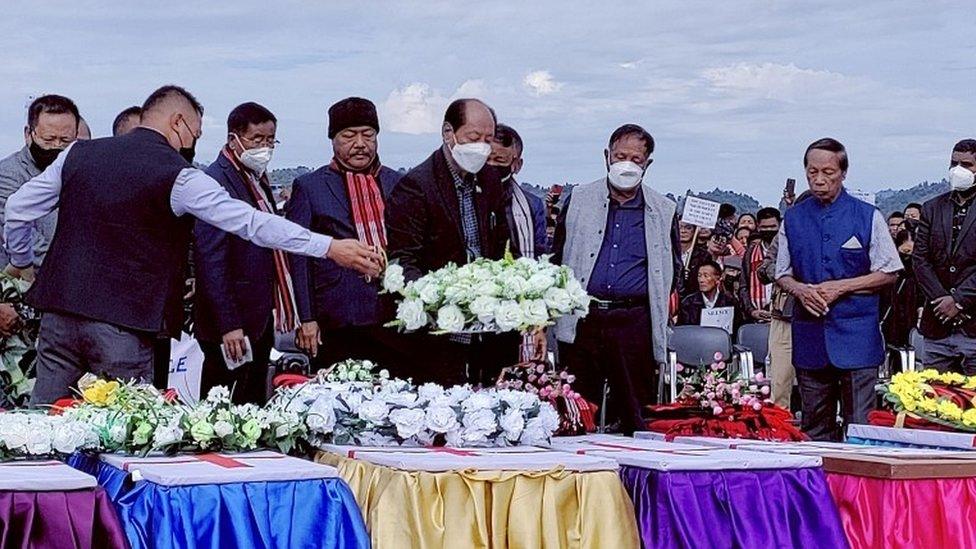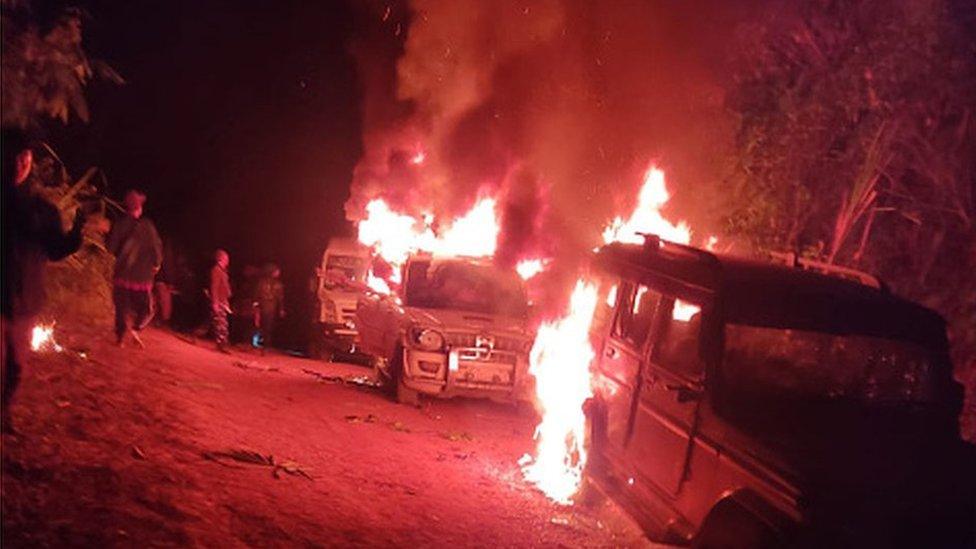Nagaland: Indian state tense after killing of 14 civilians
- Published

Indian security forces killed 14 civilians firing on a truck and later shooting at crowds that gathered to protest the attack
Tensions prevail in the restive north-eastern Indian state of Nagaland following the killing of 14 civilians by soldiers.
Authorities have shut down internet services and imposed a curfew to quell mass protests.
Violence started on Saturday when an army patrol in Mon district mistook a group of labourers for militants and opened fire, killing six.
The army called it a "case of mistaken identity" but locals reject the claim.
An Indian soldier and seven more people died as angry locals clashed with the troops in the region. On Sunday afternoon, another civilian was killed by forces after protesters attacked an army camp.
Indian Home Minister Amit Shah, who is responsible for domestic security, has expressed "deep anguish" over the incident, and the Nagaland state government has promised a high-level inquiry led by a Special Investigation Team (SIT).
The violence marks one of the deadliest escalations in recent years in Nagaland, which has long been roiled by insurgency and ethnic divisions led by local militant groups. And it is not the first time that Indian security forces have been accused of wrongly targeting innocent locals in their operations.

As anger rippled, protesters torched cars and clashed with security troops in Mon
Saturday's incident took place in Mon, along the border with Myanmar (previously known as Burma), during a counter-insurgency operation led by soldiers of the Assam Rifles, an Indian army unit, and an elite para-commando battalion.
The Indian army said the soldiers had been responding to "credible intelligence inputs" about the movement of separatist guerrillas in the region, who often cross into Myanmar after attacking security forces.
The soldiers opened fire on a truck carrying coal miners to their villages for their usual weekend rest. The locals allege the firing was unprovoked, but the soldiers claim they fired when the miners "refused to cooperate", leading to suspicion that they were insurgents.
The army maintains the botched up operation was a "case of mistaken identity".
"It was truly a case of mistaken identity, so when angry locals set fire to a military camp on Sunday, the soldiers maintained utmost restraint and did not shoot at them," says Jaideep Saikia, a security analyst.

Neiphiu Rio, Chief Minister of Nagaland, places a wreath on a coffin during a mass funeral of civilians
But experts say "mistaken identity" does point to lack of "credible intelligence" and raises questions about counter-insurgency operations. The Nagaland police has lodged a complaint against the security forces, saying that it is "obvious" that their "intention" was to "murder and injure civilians".
"This is horrible and outrageous," said Sanjoy Hazarika, writer and commentator on north-east India. He blamed "the omnibus protection provided to the security forces" under India's Armed Forces Special Powers Act (AFSPA) as the "major obstacle to justice" in the troubled region.
AFSPA is a controversial anti-insurgent law that gives the security forces the powers of search and seizure. It also protects soldiers who may kill a civilian by mistake or in unavoidable circumstances during an operation. The law has been blamed for "fake killings" and campaigners say it is often misused.
Nagaland is home to India's oldest ethnic rebellion, dating back to the 1950s. The armed movement revolves around the demand for an ethnic homeland - a sovereign territory that includes Nagaland and all Naga-habited areas of the neighbouring states of Assam, Manipur, Arunachal Pradesh as well as Myanmar.
An agreement in 1975 led to the surrender of the biggest rebel faction, the Naga National Council. But a breakaway faction, National Socialist Council of Nagaland (NSCN), consisting of fighters trained and armed by China, denounced the agreement and decided to fight on.
In 1997, the NSCN's main faction led by Thuingaleng Muivah finally agreed to a ceasefire and started negotiations with the Indian government.
A "framework agreement" signed by the two sides in 2015 laid the basis for final settlement but the negotiations are stuck because Delhi is unwilling to concede the NSCN's demand for a separate flag and a separate constitution for Nagaland.
Indian troops, which attacked the truck carrying miners on Saturday, were hunting for guerrillas of another NSCN faction that opposes Mr Muivah's negotiations with Delhi and carries out attacks from its bases in Myanmar's Sagaing region.

The Nagaland government has promised an inquiry into Saturday's violence
The 1,643km (1,020 miles) border between India and Myanmar is largely hilly, home to multiple separatist insurgencies on both sides.
One such rebel group, the Peoples Liberation Army, active in Nagaland's neighbouring state of Manipur, carried out a vicious attack on an Assam Rifles convoy last month, killing an army colonel, his wife and minor son and four soldiers.
Some say the troops were desperate to hit back to avenge the killing of their commander.
Others say their counter-insurgency tactics are outdated, the emphasis on "area domination" through show of force largely misplaced and that they need to win the "hearts and minds" of local people to gather "credible intelligence".